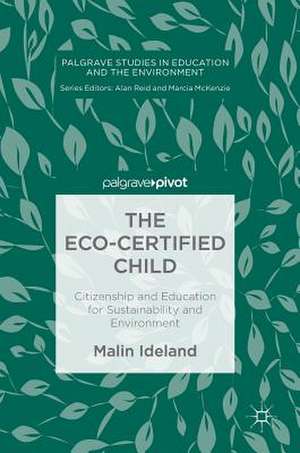The Eco-Certified Child: Citizenship and Education for Sustainability and Environment: Palgrave Studies in Education and the Environment
Autor Malin Idelanden Limba Engleză Hardback – 29 noi 2018
Foreword by Thomas S. Popkewitz
Preț: 362.02 lei
Preț vechi: 436.17 lei
-17% Nou
Puncte Express: 543
Preț estimativ în valută:
69.28€ • 71.58$ • 57.63£
69.28€ • 71.58$ • 57.63£
Carte tipărită la comandă
Livrare economică 20 martie-03 aprilie
Preluare comenzi: 021 569.72.76
Specificații
ISBN-13: 9783030001988
ISBN-10: 3030001989
Pagini: 139
Ilustrații: XXXI, 162 p.
Dimensiuni: 148 x 210 x 18 mm
Greutate: 0.39 kg
Ediția:1st ed. 2019
Editura: Springer International Publishing
Colecția Palgrave Pivot
Seria Palgrave Studies in Education and the Environment
Locul publicării:Cham, Switzerland
ISBN-10: 3030001989
Pagini: 139
Ilustrații: XXXI, 162 p.
Dimensiuni: 148 x 210 x 18 mm
Greutate: 0.39 kg
Ediția:1st ed. 2019
Editura: Springer International Publishing
Colecția Palgrave Pivot
Seria Palgrave Studies in Education and the Environment
Locul publicării:Cham, Switzerland
Cuprins
Chapter 1. Making the Other through good intentions.- Chapter 2. Free-range children.- Chapter 3. Eco-certified energy.- Chapter 4. Locally grown.- Chapter 5. Natural - with no artificial additives.- Chapter 6. Eco-certified children and irresponsible adults.
Recenzii
“I found myself engaged with the arguments of the book and the freshness of the data analyzed. … I see myself already planning to make it a mandatory reading in my graduate course on environmental education.” (Giuliano Reis, Science & Education, Vol. 31, 2022)
“My assessment, biased by my training as a cultural anthropologist, is that The Eco-Certified Child is a signature text and a must-read for those teachers teaching the teachers.” (Paul H. Mason, Australian Journal of Environmental Education, Vol. 37, 2021)
“My assessment, biased by my training as a cultural anthropologist, is that The Eco-Certified Child is a signature text and a must-read for those teachers teaching the teachers.” (Paul H. Mason, Australian Journal of Environmental Education, Vol. 37, 2021)
Notă biografică
Malin Ideland is Professor of Educational Sciences at the Faculty of Education and Society, Malmö University, Sweden. Specializing in ethnology, her research interests centre around the discourse of environmental and sustainability education.
Textul de pe ultima copertă
While few could dispute the need for Environmental and Sustainability Education (ESE) for children and young people, this book analyses the problems inherent in this educational practice. Despite good intentions, the author highlights how ESE can in fact contribute to a (re)production of harmful norms and possible subjectivities by categorizing various groups as ‘threats’ to the environment. The author analyzes how these categorizations are entangled in historical discourses on social class, nationality and race, thus resulting in double gestures of inclusion and exclusion. Even as sustainability and environmental engagement becomes a treasured identity for the affluent, the author highlights that despite the best of intentions, the discourse of ESE can reinforce positions of suborder and superiority, which could even impede real change in the long run. This illuminating book will be of interest to students, scholars and practitioners of sustainability education.
Malin Ideland is Professor of Educational Sciences at the Faculty of Education and Society, Malmö University, Sweden. Specializing in ethnology, her research interests centre around the discourse of environmental and sustainability education.
Caracteristici
Explores how Environmental and Sustainability Education is embedded in historical discourses on social class, nationality and race Highlights how the discourse of ESE can further embed and reproduce positions of suborder and superiority Problematizes children's roles in the sustainable world and asks how we can make the adults of today accountable









